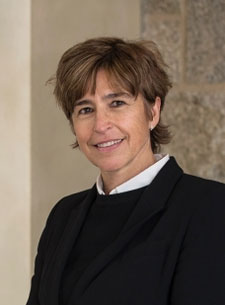Scholars to gather for Jay Phillips Center's interfaith symposium
September 28, 2015

Keynote speaker Catherine Cornille, Newton College Alumnae Chair of Western Culture at Boston College
The Jay Phillips Center for Interfaith Learning, a joint enterprise of Saint John's University and the University of St. Thomas, will host the symposium "Christian Faith in a Multifaith World" Oct. 12-13 in the Anderson Student Center's Woulfe Alumni Hall on the St. Paul campus of the University of St. Thomas.
The symposium is open to the public but registration is required, except for college students who may attend all sessions other than the banquet free of charge. For students registering for the banquet and for all others registering for the symposium, visit the Jay Phillips registration page.
Marking the 50th anniversary of the Second Vatican Council's landmark document on interfaith relations, the symposium will feature a keynote address on the legacy of the document as well as four sessions devoted to relations between Christians and members of the four religions other than Christianity mentioned in the document: Hinduism, Buddhism, Islam and Judaism.
The document, known as Nostra Aetate, from its opening Latin words meaning "in our time," and also as Declaration on the Relationship of the Church to Non-Christian Religions, was promulgated toward the end of the Second Vatican Council (1962-1965) on Oct. 28, 1965.
"Some of the most significant reforms to come from the council were generated by Nostra Aetate, the shortest of the council's 16 documents," said John Merkle, the Jay Phillips Center's director and professor of theology at the College of Saint Benedict and Saint John's University.
"By acknowledging truth and holiness in other religions and encouraging Christians to engage in dialogue and collaboration with followers of these religions, Nostra Aetate signaled a dramatic change in Roman Catholic teaching about other religions and about Christianity's relationship to them," Merkle said.
The keynote address at the symposium will be delivered by Catherine Cornille, Newton College Alumnae Chair of Western Culture at Boston College, at 7:45 p.m. Monday, Oct. 12. The schedule, session titles and speakers for the four other sessions are:
- 1:45-3:30 p.m. Oct. 12, Christian-Hindu Encounter, lectures by Bradley Malkovsky, professor of comparative theology at the University of Notre Dame, and Anantanand Rambachan, professor of religion, philosophy and Asian studies at St. Olaf College;
- 4-5:45 p.m. Oct. 12, Christian-Buddhist Encounter, lectures by Peter Feldmeier, Bacik Endowed Chair in Catholic Studies at the University of Toledo, and Mark Unno, associate professor of East Asian religions at the University of Oregon;
- 9-10:45 a.m. Oct. 13, Christian-Muslim Encounter, lectures by Sandra Keating, director of the Development of Western Civilization Program at Providence College, and Homayra Ziad, Muslim scholar at the Institute for Christian and Jewish Studies, Baltimore;
- 11:15 a.m. to 1 p.m., Oct. 13, Christian-Jewish Encounter, lectures by Mary Boys, dean of academic affairs and Skinner and McAlpin Professor of Practical Theology at Union Theological Seminary in New York City, and Ruth Langer, professor of Jewish studies at Boston College.
"All of the symposium speakers are leading experts in interfaith relations who communicate beautifully with college students and lay audiences, and there will be ample time in each session for audience interaction with the speakers," Merkle said.
Merkle stressed that the speakers at the symposium "will not just be examining the content of Nostra Aetate but will be exploring the development of interfaith relations since the Second Vatican Council and looking ahead to future possibilities."
The Jay Phillips Center has received support for the symposium from The Jay and Rose Phillips Family Foundation of Minnesota, the College of Arts and Sciences of the University of St. Thomas, the College of Arts and Sciences of the College of Saint Benedict/Saint John's University, and the Center for Catholic Studies at St. Thomas.
